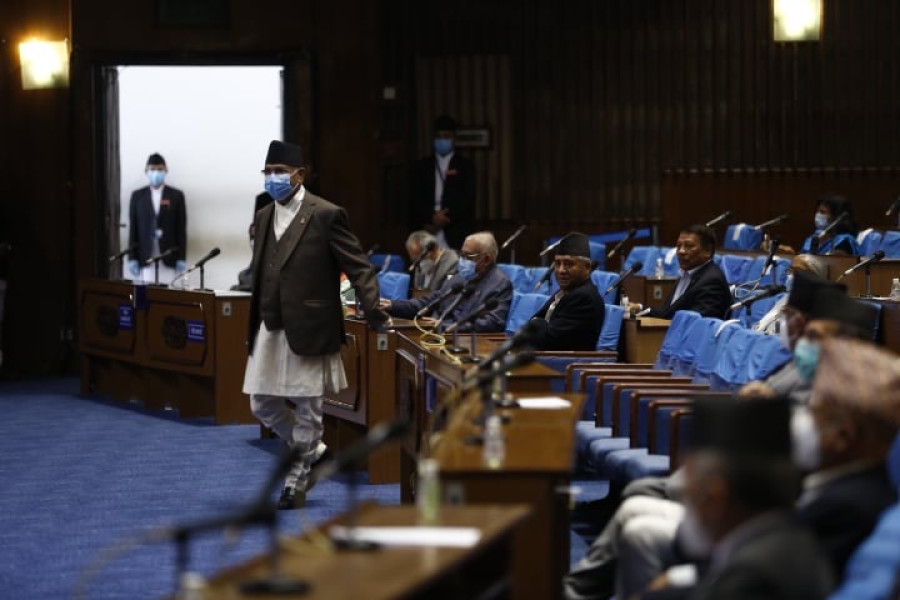Politics
In three hours before Parliament, Oli presents problems but offers few solutions
At a time when the nation is looking for empathy, effectiveness and hope from the prime minister, Oli failed to provide any real roadmap for the days ahead, observers say.
Anil Giri
In a three-hour address to Parliament on Tuesday, Prime Minister KP Sharma outlined a litany of problems that are assailing the country, but failed to provide any short or long-term solutions.
Politicians and observers say that Oli’s Tuesday speech was an opportunity for the prime minister to lay out a solid roadmap for the days ahead, especially when it comes to dealing with the Covid-19 pandemic and the boundary dispute with India, but the opportunity was squandered.
The address to Parliament following the announcement of the government’s policies and programmes is a forum for the prime minister to respond to lawmakers regarding the government’s priorities for the upcoming year. The programmes for the upcoming fiscal year were announced by President Bidya Devi Bhandari on Friday.
In past years, the ruling party stood behind Oli, but this year, in marked contrast, no one from the ruling party, particularly party chair Pushpa Kamal Dahal and senior leader Madhav Kumar Nepal, spoke in defence of the Oli government, according to one ruling party leader.
“The changing dynamics inside the party manifested in the House,” the Central Committee member said. “Only deputy Parliamentary Party leader Subas Nembang and party General Secretary Bishnu Poudel defended the government in the lower house.”
Over the past few months, dynamics within the ruling Nepal Communist Party (NCP) have fluctuated widely. Oli narrowly managed to get out of a bind where most senior leaders in the party had allied against him and planned to call for his resignation as prime minister. While things have settled down for the time being in the party, suspicions remain, with Nembang and Poudel the last of Oli’s confidantes.
Speaking about the Covid-19 pandemic, the biggest challenge before the country today, Oli blamed the rising number of coronavirus cases on individuals breaking the nationwide lockdown, especially those sneaking into Nepal from India.
“Those who are coming from India through illegal channels are spreading the virus in the country and some local representatives and party leaders are responsible for bringing in people from India without proper testing,” Oli said. “It has become very difficult to contain Covid-19 due to the flow of people from outside.”
Besides controlling the flow of people, Oli did not provide specific measures to limit the spread of Covid-19 within the country. With two deaths and over 400 cases, there are fears that the pandemic could quickly overwhelm Nepal’s poor health infrastructure.
“The prime minister looked like the Health Ministry spokesperson,” said Krishna Pokharel, a political commentator. “I could not find any compassion in his speech as the head of the government.”
According to Pokharel, at a time of crisis when citizens are looking towards the prime minister for leadership and hope, Oli was unable to assure the nation that the government is ready to fight Covid-19.
Oli, however, played up his one visible achievement—the endorsement of a new political map.
During the question and answer session, Oli took credit for coming up with a new political map, one that includes all disputed territories to the northwest of Nepal, and vowed to bring back all land currently occupied by India.
“Kalapani, Lipulekh and Limpiyadhura belong to Nepal,” said Oli. “This is not just rhetoric; we will bring our land back.”
The Oli Cabinet on Monday approved a new map of Nepal that includes Kalpani, Lipulekh and Limpyudhara, parts of which are currently occupied by India, in response to the recent inauguration of a road section by New Delhi via Lipulekh.
Oli said that he would initiate dialogue with India to reclaim the land but it remains unclear just how that process will move forward. Nepal has been demanding talks with India ever since November, when India published a new political map by putting Kalapani within its borders. After the inauguration of the new link road, the Oli government protested via an official statement, leading India to say that talks would be held once the Covid-19 pandemic is over.
But according to former minister and diplomat Bhekh Bahadur Thapa, the release of the new map could further complicate matters.
“My concern is, what next?” said Thapa, who was also the coordinator from the Nepali side on the Eminent Persons’ Group on Nepal-India relations. “We did not get any clear roadmap from the prime minister. Now, both countries have two different maps and that is not going to provide a solution.”
Observers say that Oli’s response in Parliament failed to show encouragement and offer hope to the people at this difficult time and did not offer any hope.
“After listening to Prime Minister Oli for three hours, I do not see any indication that he has acknowledged his weaknesses and is trying to improve. Listening to him talk about corona, nationality and democracy, I saw a deadly cocktail of half-truths and arrogance,” former prime minister Baburam Bhattarai wrote on Twitter.
According to analysts, it was not just Oli’s address to Parliament that failed to provide anything of substance; the government’s policies and programmes themselves are misguided.
“The policies and programmes announced by the government attempt to be unusually comprehensive and to take the long view,” Swarnim Wagle, former vice-chair of the National Planning Commission, told the Post over email. “But in doing so, it appears to be tone-deaf and lacking a sense of urgency when the nation expects empathy, effectiveness and alacrity.”




 15.12°C Kathmandu
15.12°C Kathmandu















